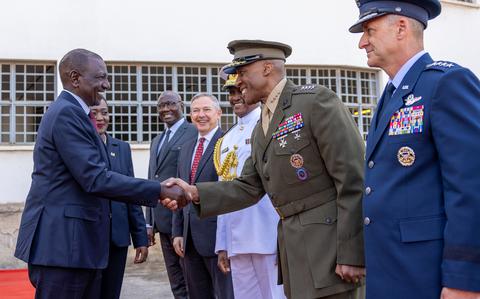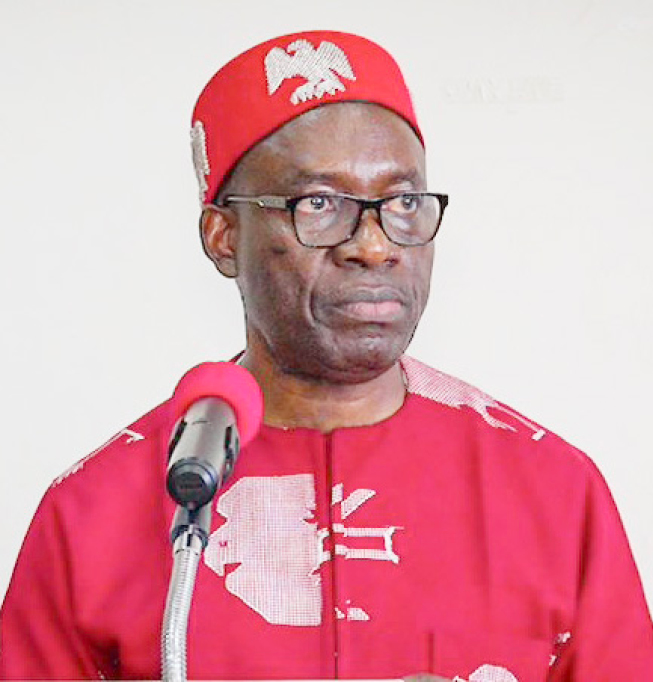Frontline Ghana: How AFRICOM's new strategy puts West Africa at the heart of global security
A GNA Feature by James Amoh Junior
Accra, June 02, GNA – A new war is unfolding across Africa. It is not fought only with guns and drones, but with ideas, alliances, and resolve.
At its centre stands Ghana — no longer a silent observer, but a key player in a fast-changing global security equation.
“Terrorist networks affiliated with ISIS and al-Qaida are thriving…One of the terrorists’ new objectives is gaining access to West Africa coasts,” warns U.S. Marine Corps General Michael Langley, Commander of U.S. Africa Command (AFRICOM).
The warning comes not with sirens, but with the calm authority of a seasoned commander. Yet the urgency in General Langley’s voice was unmistakable.
From his post in Nairobi, where the Africa Chiefs of Defense Conference had just concluded, the U.S. AFRICOM chief looked squarely at the threat facing the continent — and the world.
Africa’s coastlines, once seen as trade gateways and economic lifelines, are now being eyed by terrorist networks as launchpads for transnational crime and global reach. And in that shadowy race for control, Ghana is no longer a bystander — it is a bulwark.
What is unfolding is not just a battle of arms, but a contest of wills, governance, and vision. Ghana’s position as a regional peace anchor is being tested by the creeping chaos from the north — by militants who move faster than borders can hold and who exploit every weakness, from poverty to political instability.
But in this fight, something remarkable is happening: the frontline is not folding — it is holding. And increasingly, it is African-led.
“African militaries are taking on security challenges head-on. They continue to step up and take control of their own futures.” General Langley says during a digital press briefing.
As instability deepens in the Sahel — with Burkina Faso, Mali, and Niger struggling to contain extremist violence — Ghana and its fellow Gulf of Guinea nations are being drawn into the vortex. But rather than folding under pressure, these nations are standing firm.
“Our coastal partners – Ghana, Côte d’Ivoire, and Benin – are fighting fiercely along their northern borders to prevent terrorist expansion and U.S. AFRICOM is standing with them.” General Langley states.
Ghana has long been seen as a beacon of democratic stability in West Africa. Now, that credibility is being tested on the security front.
The growing threat from the Sahel’s jihadist groups is not theoretical. These groups are expanding, regrouping, and seeking new financial lifelines.
General Langley explains that the coastlines are becoming prime targets. “If they secure access to the coastline, they can finance their operations through smuggling, human trafficking, and arms trading.
This puts not just African nations at risk, but also increases the chance of threats reaching the U.S. shores.”
Ghana’s location, leadership, and proactive stance in regional defense collaborations have made it a keystone partner in AFRICOM’s evolving strategy — one centred not on foreign-led interventions, but African command and control.
General Langley’s remarks reflects a dramatic shift in how the United States engages African militaries.
Gone is the era of dependency and donor-recipient dynamics. In its place, AFRICOM now champions a doctrine of readiness, regional leadership, and self-sufficiency.
“We’re always stronger when we stand together.” Gen. Langley remarks, and adds, “But all these exercises… are no longer about dependence. It’s about progressing to independent operations.”
Exercises like African Lion, Flintlock, and Justified Accord — along with maritime drills such as Obangame Express — are now structured to foster operational autonomy among African forces. Ghana has often served as a host or key contributor to these engagements.
Gen. Langley notes, “These exercises are about building interoperability among nations…So crisis response and command-level leadership can be driven from within African militaries.”

This year’s Justified Accord, co-hosted by Kenya, Djibouti, and Tanzania, brought together over 1,300 troops from 20 nations.
The goal was not just joint maneuvers, but to sharpen real-world readiness, leadership coordination, and crisis management — a model Gen. Langley believes Ghana is well placed to replicate and expand.
AFRICOM’s strategy aligns well with Ghana’s own approach: Investing in professional military education, building intelligence capacity, and maintaining close civil-military relations.
“AFRICOM’s aim is to support African nations in building the self-reliance needed to confront terrorism and insurgency by assisting in building strong, capable military and security forces.” Gen. Langley emphasised.
In perhaps the most telling moment of the briefing, Langley shifted the conversation from weapons to people.
“Security is rooted in the strength of communities,” he stresses and that “Militaries must therefore be deeply integrated into society writ large to ensure safety and prosperity.”
He shared his experience in Kibera, Nairobi, where he met with SHOFCO — a grassroots organisation led by Dr. Kennedy Odede that empowers communities through education, health services, and women’s leadership.
Operating in over 40 counties, SHOFCO is proof, Langley says, that real security begins with social stability.
“That’s the model of how real security starts at the ground level – with the people,” he adds.
The message resonates in Ghana, where community-led initiatives, religious networks, and civic organisations have played a quiet but powerful role in fostering peace, especially in border regions.
For AFRICOM, these local actors are no longer side players — they are central to long-term peacebuilding.
Gen. Langley’s reference to a “whole-of-society” approach signals a broader philosophy: that stability doesn’t come from foreign bases or firepower alone, but from education, inclusion, and trusted local institutions.
While AFRICOM’s recalibration favours cooperation, it also comes with strategic caution.
General Langley acknowledged the evolving geopolitical landscape influencing Africa’s security environment, highlighting the importance of strategic engagement on the continent.
He notes, “One of my key directives from Secretary Hegseth is to ensure a balanced approach to military engagement in Africa, mindful of the increasing presence of global powers, including China.”
Gen. Langley adds, “While the U.S. remains committed to fostering transparent and mutually respectful partnerships, it is essential to work collaboratively with all stakeholders to promote sustainable development and long-term stability across the region.”
Careful not to frame the conversation as a zero-sum rivalry, General Langley, instead, implied that African nations — Ghana among them — must retain the sovereign right to choose partnerships that prioritize sustainability, transparency, and mutual respect.
His tone throughout the press briefing was clear: AFRICOM does not seek to dominate, but to stand beside. “It’s about empowering African nations to solve African problems, not just through handouts but through trusted cooperation.”
The briefing concluded on a hopeful note — one anchored not in military metrics, but in human potential, as Gen. Langley spoke of young Africans shaping their future through innovation, not insurgency.
“In Algeria, I met with a youth robotics team applying technology to solve local problems. In Gabon, I saw students enrolled in STEM programmes planning their projects for the future. That is proof that African innovation will be a force of stability.”
He recounted conversations with cadets at Morocco’s military academy and meetings with aspiring leaders in Mauritania and Nigeria. Their passion, he says, is the most powerful counterweight to extremism — and the best bet for Africa’s stability.
For Ghana, where innovation hubs and youth-led civic movements are growing, this is fertile ground for collaboration.
As General Langley prepares to step down — with a successor expected soon — his final message to African partners was filled with both urgency and trust.
“A safe and stable and prosperous Africa is not a charitable goal,” he declares and states that, “It is a strategic necessity for the United States and for our African partners.”
In that vision, Ghana’s role is pivotal. The country is no longer just a reliable partner — it is emerging as a model of military professionalism, democratic stability, and regional responsibility.
As terrorist networks adapt, borders shift, and global power dynamics evolve, Ghana is being asked not only to hold the line — but to lead it.
“AFRICOM will continue to stand shoulder to shoulder with African partners into the future.
And I am excited to see Africa’s emerging leaders drive progress not just across the continent but across the world.” Gen. Langley acknowledges.
The battle for Africa’s future will not be decided in Washington or Beijing. It will be shaped by the choices, capabilities, and convictions of its own people — and Ghana, now more than ever, is poised to help shape that destiny.
GNA
Edited by Samuel Osei-Frempong











